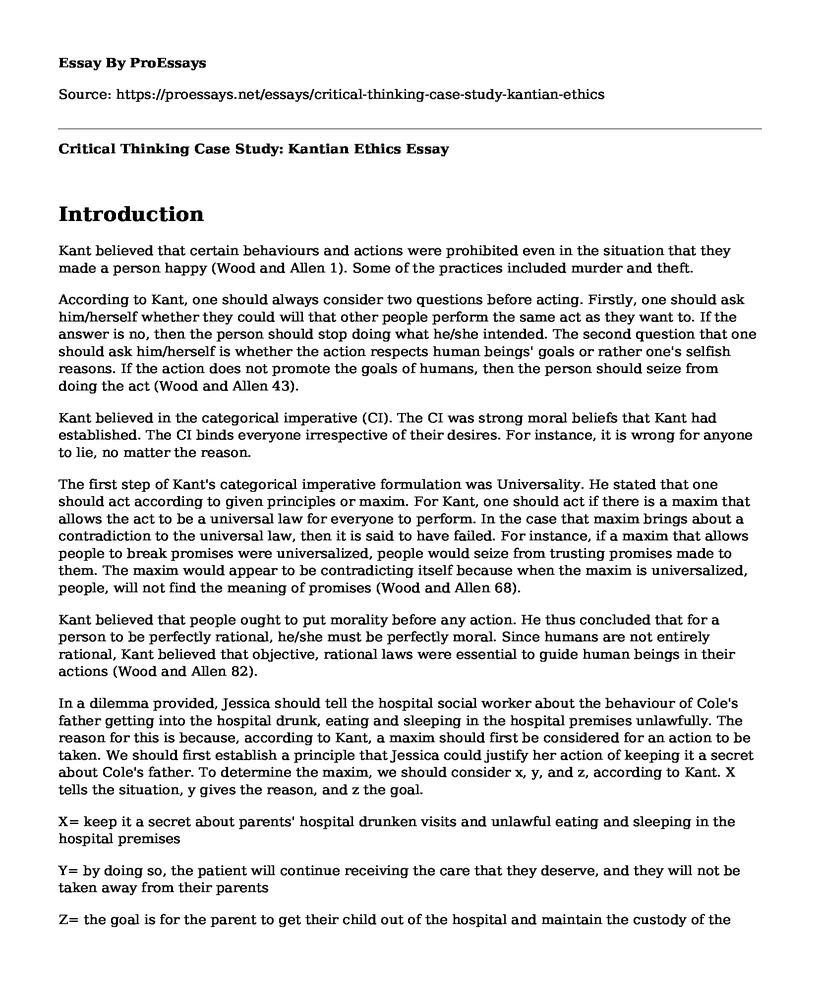Introduction
Kant believed that certain behaviours and actions were prohibited even in the situation that they made a person happy (Wood and Allen 1). Some of the practices included murder and theft.
According to Kant, one should always consider two questions before acting. Firstly, one should ask him/herself whether they could will that other people perform the same act as they want to. If the answer is no, then the person should stop doing what he/she intended. The second question that one should ask him/herself is whether the action respects human beings' goals or rather one's selfish reasons. If the action does not promote the goals of humans, then the person should seize from doing the act (Wood and Allen 43).
Kant believed in the categorical imperative (CI). The CI was strong moral beliefs that Kant had established. The CI binds everyone irrespective of their desires. For instance, it is wrong for anyone to lie, no matter the reason.
The first step of Kant's categorical imperative formulation was Universality. He stated that one should act according to given principles or maxim. For Kant, one should act if there is a maxim that allows the act to be a universal law for everyone to perform. In the case that maxim brings about a contradiction to the universal law, then it is said to have failed. For instance, if a maxim that allows people to break promises were universalized, people would seize from trusting promises made to them. The maxim would appear to be contradicting itself because when the maxim is universalized, people, will not find the meaning of promises (Wood and Allen 68).
Kant believed that people ought to put morality before any action. He thus concluded that for a person to be perfectly rational, he/she must be perfectly moral. Since humans are not entirely rational, Kant believed that objective, rational laws were essential to guide human beings in their actions (Wood and Allen 82).
In a dilemma provided, Jessica should tell the hospital social worker about the behaviour of Cole's father getting into the hospital drunk, eating and sleeping in the hospital premises unlawfully. The reason for this is because, according to Kant, a maxim should first be considered for an action to be taken. We should first establish a principle that Jessica could justify her action of keeping it a secret about Cole's father. To determine the maxim, we should consider x, y, and z, according to Kant. X tells the situation, y gives the reason, and z the goal.
X= keep it a secret about parents' hospital drunken visits and unlawful eating and sleeping in the hospital premises
Y= by doing so, the patient will continue receiving the care that they deserve, and they will not be taken away from their parents
Z= the goal is for the parent to get their child out of the hospital and maintain the custody of the child.
The maxim can be formulated as follows: I am to keep it a secret about a parent's drunkard hospital visits to their child and unlawfully eating and sleeping in the hospital because doing so will make the child receive the necessary care and also the parent will retain custody. The next step is to generalize the maxim and put it as a law of nature. According to this dilemma, if it is made a law of nature that every nurse does as Jessica is doing, it will be wrong, and so the answer is no. Jessica should, therefore, report the matter.
Works Cited
Wood, Allen W. Kantian ethics. Cambridge University Press, 2007.
Cite this page
Critical Thinking Case Study: Kantian Ethics. (2022, Feb 12). Retrieved from https://proessays.net/essays/critical-thinking-case-study-kantian-ethics
If you are the original author of this essay and no longer wish to have it published on the ProEssays website, please click below to request its removal:
- God and Cosmology Essay Example
- Delivering Negative News Essay
- Australian Perception, Media Law and Ethics Paper Example
- Tesla Ethics and Social Responsibilities Essay Example
- Ethics Auditing Essay Example
- Navigating Cultural, Legal & Ethical Challenges in Global Business - Essay Sample
- The Vitality of Personal Data Privacy: Trust & Security - Free Paper Example







